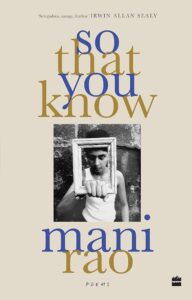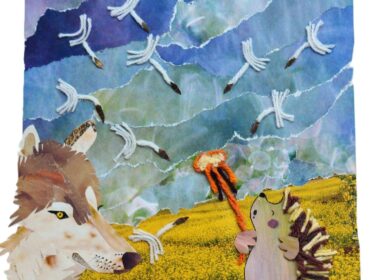Review: So That You Know | Mani Rao
By Kabir Deb

Art is not personal. It also is not a projection of our inner ‘self’. Rather, what we think and create is a truth that holds an illusion of manifestation. Artists are bound to be the people who are seen and they represent whatever they come across with or without pretension. Some may refer to them as subjects of voyeurism. Others know that if they are not seen or heard, they will write something that is going to remain distant. Thus, when Jorge Luis Borges says, I am not sure that I exist, actually. I am all the writers that I have read, all the people that I have met, all the women that I have loved; all the cities I have visited, he is actually telling us that he has engulfed everything and everyone he met. Mani Rao, in her recent collection of original poems so that you know, establishes something similar where she allows us to see who she is through her associations with people, relationships, dreams and complexities, without putting any filter. Here, poetry is exhibited, to endorse the unseen territories.
Society is habituated of developing certain customs and rules around its institutions. Marriage being one of them, finds less room to any catharsis. Mani Rao’s poem This Marriage, is a naked revelation of how most marriages work when surrounded by invisible statutes. These statutes get larger with time and then the society leaves nothing but a force that compels one to stay within its periphery. The locked, peeking eyes work as surveillance bodies, which further effects the people living under the institution. In the poem, the overcoat can be imagined as a clever metaphor of both a human being’s body or something that can be coined as a burden. The line all my closet overcrowded, magnifies the noise and claustrophobia that crowds around individual freedom. The poet, in the last stanza, speaks the voice of most women who simply leave thinking about these issues to live in a bit of peace. Through this short poem, Mani draws the nucleus of most marriages.
All my suitcases were full
And my closet overcrowded
So, I just let it sit
upon my shoulders.
In the poem Island, the poet writes about the necessity of distancing oneself from the crowd. Being alone is a primary component most of us do not explore. In that space, we manifest and speculate some world which is different from the one we live in. To be more practical, the poet also writes that if we want a person in that situation, we can simply manifest one to arrive. With this particular thought, the poet balances both the needs of a human being. During the moments of solitude, we assemble a world which may or may not exist, but its presence in our head counts for a greater realization. The latter half of the poem is where the dust settles and then Mani gives us an idea of how by experiencing solitude (sometimes loneliness), we develop an idea of how companionship works. A person in solitude opens more to provide space to those who have the affinity of an association. In the last verse, the poet knows that in loneliness we mostly forget our habits, but she is ready to make their traces stay within us; to make us not forget what we usually do – and who we truly are.
The waiting is now clean
Body leans toward the door
Door foreshadows
Who lifts the mist why is the steed on a hillock
Figure tapering over it black and grey
Speechless as though the last breath can be saved
The floor is a mess.
The time we are living in is desperate and harsh. It takes us to our saturation point and then breaks us by using its tricks. In the poem A Little Secret, Mani Rao addresses the dichotomy of who we used to be and how we have become with time. Institutionalized religion figures out its own ways to reach us and tell us to measure the supreme being with money, relevancy and virality. In the first two stanzas, the poet is rooted to the rituals which have been passed on to us by our ancestors. She is more focused on the inner peace that the customs of worship provide. The build-up of a community in places of worship have nothing to do with rituals, but is more about the energy that has a serene synergy. To find devotion in a pebble is not blindness. It is a method through which we convince our psyche to live in contentment. At present, the vastness and reach of the supreme is based on the physical size of idols and the ability of most godmen to leave no question unanswered.
Now look, the deities are out like clock towers.
Adiyogi competes with the mountain’s profile.
He is everybody’s backdrop and buddy.
Beneath a Prussian blue sky
to all the shooting stars we reply with selfies.
In the section Sing to Me, the poet explores historical figures, their lifestyle and essentialities through a series of poems. The poem Peace Treaty, speaks about Helen of Troy who is left alone by her partner because in the realm of masculinity, men seek freshness and leaves the other as unwanted. There’s no affection left and hence, the absence of love becomes cruel. Cadmus is History, on the other hand, describes the world in its wildest form where he witnesses everything that grows and falls. Jove’s Collar is an intense poem where powerholding is demonstrated by keeping gender and relationship in mind. To consider a wife a sister is a sinister process where the man wants both pleasure and protection without any condition attached. In the Shower, Thinking of Actaeon broadens the history for us which was never about restricting desire and suppressing what makes us human.
What Ovid does not offer
What Slavitt does not explain
It has the water I say
It has the water she
Squirted when you gawked
that masked your trail
(from the poem In the Shower, Thinking of Actaeon)
Poetry is never about the language we speak. It is always about the language we do not speak and yet something we want to spill out. A desperation is in operation in that particular space and poets are driven by this emotion. The poem Haul, is about giving a physical smell, visual and touch to the craft of poetry. Here the poet finds another poet in the moonstone hanging by a thread and ink is the footprint she gets to see in the cradle of beach. In this poem, the poet is aware of who she is, but then to not be overexposed, she clings to the metaphors. For a poet, audience is found in the dark and damp corners; under the rugs of a pillow; in the food that is being prepared. In sleep, dreams bring with them the elements which mostly stay out of notice and the supernatural becomes quite natural. Poetry drools because of greed and desire. It accumulates only in the presence of freedom.
I let the airline flow
Give myself some slack for a slow graze in the deep
Drooling all over the pin bloodshot
And reel it in.
Mani Rao explodes and explores in this collection of her original poems. She experiments with form, words and thoughts but we find her voice trickling down our throat to the places which have never been experienced before. These are creations which are going to work only when seeking would become our primary objective. so that you know is an important addition in Indian poetry that can either give readers a pleasant day or can make them leave the room to breathe some more. Either way, the poems are going to haunt readers with their impact.
Mani Rao is the author of twelve books of poetry, including So That You Know. Her books in translation from Sanskrit include Bhagavad Gita: God’s Song and Saundarya Lahari: Wave of Beauty. She researched mantra practices in tantric communities for Living Mantra: Mantra, Deity and Visionary Experience Today. Mani has an MFA in Creative Writing and a PhD in Religious Studies from Duke University, USA. She lives in Bangalore and Puttaparthi.





